Little altars everywhere. This is the one I created next to the couch where I slept while my mother was on her deathbed. Some of the objects on it are: my cousin’s art, my mother’s watch, my father’s signature burned into wood, my grandmother’s prayer card, a rock painted by my friend’s mom & the mourning armband she made for me, my father’s wedding ring (ask me the story), Brazilian money, Jamaican candy from my Hospice Nurse, a hamsa bracelet & year of the Dog card from my gentleman, a figa to ward off the evil eye, my Lenormand cards, the grief booklet I was given at Shay’s funeral, a squishy doughnut I won for Mom at the claw arcade, a useful Hospice pamphlet about dying, & an image of street art in my hometown, Brooklyn, painted by a Brazilian man/ St. Petersburg, FL / May 6th, 7th, or perhaps 8th, anyhow a day or few before mom’s death, 2025
Welcome to “what NOT to say when someone dies,” including actual things that actual people actually said to me after my friend Craig died, my dad dropped dead, while my mom was dying, & after she died… in the last 3 months. I’ll be your host, Lila.
“what NOT to say” will be a living document, updated whenever I have something useful, or supremely un-useful, to add.
Friends. Our grief scripts are woefully cliché.
From what I’ve heard and overheard and experienced, while the useful things people say are fairly varied (and tailored to the griever), the un-useful things tend to be generic variations on a tired theme, which is of course, part of their un-usefulness. How canned they sound. Tinny. Tinny skinny platitudes. Worn-out and saggy. Long past their expiration date. So expired a food pantry would turn ‘em away, knowmsayin’? Stale AF.
We don’t even apply the same kind of effort and imagination to our grief scripts that we would to, say, our birthday cards.
Shouldn’t our death day cards receive at least the same amount of care and forethought?
They usually don’t. But don’t take it from me. Take it from Gertrude.
Gertrude is one of the two Guardian Crone characters my friend Stephany and I accidentally created while living together after our beloved Patrick’s suicide, during spontaneous improv in silly accents.
Estelle and Gertrude were our secret language of grief. They helped us unearth a less painful way to broach the thing that felt too raw to look in the face. Sunglasses for the psyche. Because it’s really important to broach the thing. It’s really important to go in the sun. But you don’t have to burn your retinas.
To paraphrase Emily Dickinson, you can ‘look at it slant.’
You must imagine this dialogue in a New York accent — Brooklyn Jewish, preferably, but will also accept: Upper West Side Jew, Upper East Side Jew, or, in a pinch, Long Island Jew (BUT ONLY IN A PINCH).
“What kind of pinch?” I can hear Gertrude say.
She’s always with me.
In fact, I recently bought some glasses that my gentleman was first to realize must needs belong to… Gertrude’s daughter… Gladys. (He named her, and it is perfect.) Gladys visual aid:

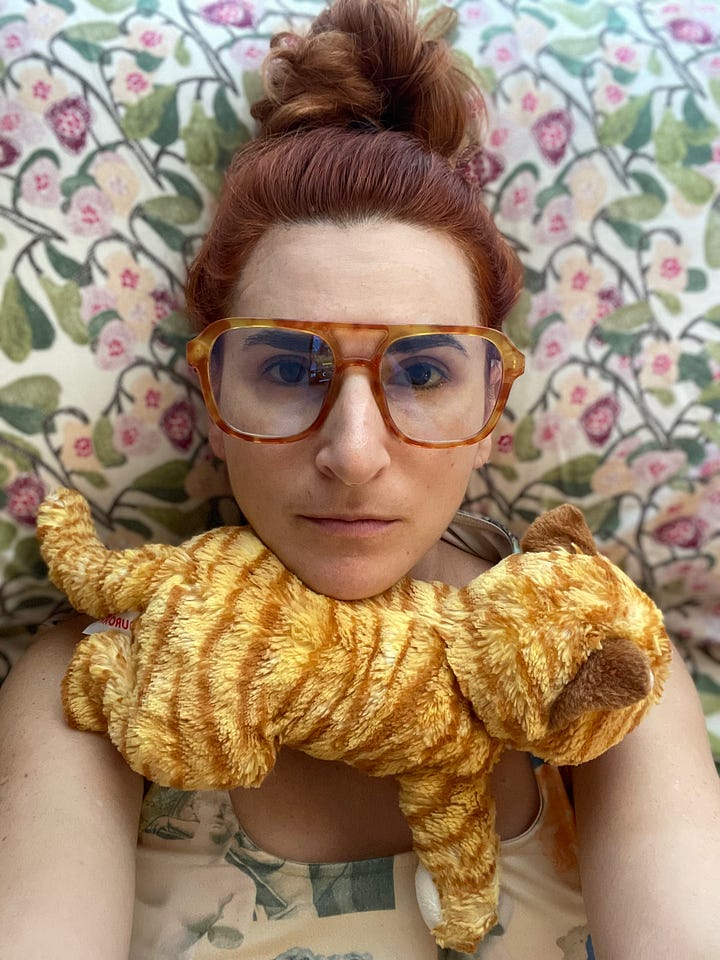
Gertrude
They say inappropriate things because there is Nothing. Appropriate. To Say. They can’t come up with anything new.
I’msosorryforyourloss I’msosorryforyourloss I’m so sorry for my condolences I’m so sorry for your loss.
Myra
It’s so good to see you I’m sorry it’s under these circumstances...
Gertrude
All I ever say is: I love you. Because I can’t even address the Loss. The word. Loss. Loss. Sounds like floss, so thin.
Unlike Gertrude (although in many ways we are TWINS), I do believe there are appropriate things to say (and I don’t mind “I’m so glad to see you; I’m sorry it’s under these circumstances.”), but of course:
Appropriate is in the ear of the receiver.
Just as you must, “Consider the source,” when discerning what feedback is actually useful to you, consider the receiver when deciding what to say while someone is grieving.
Ergo, therefore, and so, my chickadee, please consider a few choice questions before you launch forth. These things are simple, but not, in my experience, self-evident.
1. Would this person like to hear from you?
2. How close are you, really?*
3. If you were them, would it benefit you to hear what you’re about to say?
Not if you were you in their circumstances. If you were them.
* Here’s what I’m not saying. I’m not saying: If you weren’t that close to them, don’t reach out after their person dies. I am categorically not saying this. In fact, some of the most tender and genuinely comforting words ever spoken or written to me in the face of loss were composed by strangers, or relative strangers.
What I am saying is this:
Temper what you say based on the depth of your intimacy with this human, and what you know about who they are.
Side quest:
Want to know a bit more about Gertrude & Estelle? Here you will find them, cleverly enfolded in the companion piece to this essay (see what I did there?):
STOP ASKING GRIEVING PEOPLE if there's "anything you can do."
The Red Lantern / A place I loved, that is no longer // Greenpoint, Brooklyn /// circa 2012
Now, without further ado, let us learn by bad example.
what not to say
Nothing.
Of all of the things not to say, this is truly the absolute worst. Really. Saying nothing is The Pits.
Nothing is the sound of abandonment.
Nothing says something, of course.
Nothing says, ‘I don’t care enough about your pain to overcome my own discomfort and make the effort to say something, anything, risking that it might not be the right thing for you.’ It’s really about you, isn’t it, not the griever.
Nothing says, ‘You don’t mean that much to me.’
And here’s an opinion you might fully dislike: Thoughts and prayers, kept to yourself, mean nothing to a grieving person. Less than nothing. Not a thing. No Thing.
Your thoughts and prayers are not palpable to your grieving person. Your thoughts and prayers are not being delivered by owl to Hermione at the Hogwarts banquet table. Your thoughts and prayers are for you. Good for you! But if you want it to be for them, you need to reach out and say something.
Nobody is a mind reader. (Unless you’re a mind reader, I suppose. Are you?)
Here’s the major, gorgeous, exception:
If you are physically present, sitting with someone and saying nothing might be the most powerful medicine you can offer.
Potent, loving, and transformative precisely because it is not trying to change what is. To paraphrase Oriah Mountain Dreamer’s poem “The Invitation,” (lot of paraphrasing already, eh, Lila?) you are ‘sitting with pain, mine and your own, without trying to hide it or fade it or fix it.’ This is the realest thing I know.
But if you’re not physically present, and you’re just thinking on them and praying on them, but keeping it to yourself? MY GUY. How are they supposed to know you care? I’ll dial it back a tiddle. Most people can’t read minds. Which means most people can’t read your “thoughts and prayers, prayers and thoughts” on the wind.
Know how they know you’re thinking of them?
Know how they know you’re praying for them?
You already know, don’t you?
If you TELL them. That’s how they’ll know. That’s the alternative.
Say something, so they don’t give up on you.
(Do you hear the song in your head?)
I’m so sorry for your loss.
It’s just such a tired cliché, love.
I prefer:
Please accept my sincerest condolences.
I don’t know what to do / how to help / what to say to you right now.
Yo. You’re offloading your discomfort to them. Do not pass the buck. Do not make this the grieving person’s problem.
Don’t put them in the position of having to comfort you because you can’t conceive of how you can possibly comfort them!
The alternative to expressing your discomfort at them:
Come up with something! and make them an offer. Ideally an offer they wouldn’t want to refuse. Ideally a multiple choice offer. Ideally consisting of things you would genuinely love to do for them. See the aforementioned essay “STOP ASKING GRIEVING PEOPLE if there’s anything you can do (Do this instead)” for my Multiple Choice Method of Showing Up for Someone.
Is there anything I can do?
Listen. We are over here burning macaroni in frying pans.
This was a few days after my dad died / Gulfport, FL // April 2025
You think we can figure out what it is we need,
discern whether you’re the right person to ask for that thing,
consider if you’d be willing to do such a thing,
contemplate whether you’d have the bandwidth for that thing right now,
articulate how to ask for it,
and then drum up the energy to take the risk and actually ask you for the thing we really need?
While our nervous system is doing the tarantella on our executive function?
7ish year old Lila / Freeport, Long Island // circa 1989
Here’s the real real on this. Even ifwhen we do manage to ‘get it up’ to ask for something… because I did, sometimes! This sort of thing can happen. Sometimes the clouds part for a shining moment of griefclarity, and I managed to ask for a thing.
When that happened, this happened. In fact, it has happened at least five times since my parents died:
Seemingly well-meaning person asks, “Is there anything I can do?”
I somehow manage to reply, “Yes, actually, I could really use xyz or the other thing.”
And then?
And then, besties?
They ghost me like some guy on Tinder. I’m talking friends of 20 years, even.
Radio fucking silence.
Absolutely nothing.
This one really rankles. Because they offered! They may as well not have offered, and it would hurt less.
I suspect the progression goes something like this:
You ask.
They don’t want to do the thing you ask.
They feel ashamed they don’t want to do the thing.
They don’t want you to know that they don’t want to do the thing, because they think it will make them look bad. (To WHOM? TO WHOME I SAY?)
They certainly don’t want to admit that they offered you help but only actually want to give it in some uber-specific way that they are not telling you.
So instead of asking if there is some other thing they can do, something more suited to their talents / skills / inclinations / cash flow / energy levels / available time slots (Would you like something like this? Would you prefer something like that?), they disappear, perhaps betting on the fact that you are so grief-stricken you won’t really notice.
Of all the things they could offer you, they choose: nothing. And then, I have the sneaking suspicion that they pretty soon forget about it.
I’ll speak for myself: I notice.
…..
I mean, they asked, right! They did their part! They didn’t actually expect you to ask for a thing? You’re supposed to be too overwhelmed to articulate your needs and wants, so people can feel good about asking and also relatively sure they won’t be put on the spot with some kind of request! Win win, for them!
Really, griever. How dare you actually make a genuine request for an act of service after somebody asks you point blank “Is there anything I can do?” Why would you take that question at face value? Don’t we know we’re supposed to say, “Oh that’s so incredibly sweet and generous of you to ask, no, I don’t need anything, but just the fact of you asking means so much.”
Honestly how dare you need something, and have the audacity to express it. How greedy of you, amirite?
The alternative to asking what you can do:
Don’t give them homework. Give them options.
But make sure not to offer anything you don’t truly want to give.
When I was working as an extra in Film & TV, and I presented my suitcaseful of costume options to the wardrobe department, they unfailingly picked my least favorite outfit. This goes for consulting other humans on wedding cakes and paint colors too. You’re welcome.
Oh, this next one is a sincere unfavourite of mine:
I can’t imagine what you’re going through.
And its tepid variations:
I can’t even imagine.
I just cannot imagine.
I can’t imagine how hard this is for you.
Bitch yes you can! Yes, you can. You are not so impoverished of imagination that you cannot imagine. If you can think, you can imagine. If you can fantasize, you can imagine. You just don’t want to. Because imagination is powerful. And if you imagine it, you might experience this thing known as empathy, and then you might feel an echo of my pain, too.
You can imagine. Don’t even pretend.
Instead of “I can’t imagine what you’re going through,” try:
I understand.
I overstand
I feel you.
I feel for you.
I feel for you so deeply.
I feel with you.
I resonate.
I get it.
I can imagine!
I’ve been through something similar.
My heart hurts with you.
My heart hurts for you.
Ufffffffffffff.
Fuck.
If I were you, I’d feel the same.
If you insist on mentioning how hard this is, consider:
This must be so hard.
You’re going through a lot.
Don’t tell people what they’re going through. Come on, now.
Chin up.
Stop. Let my chin be anywhere it wants to be.
Hang in there.
Stoppp.
Especially avoid its diminutive variation, “Hang in there, kiddo,” even if the other person, and perhaps especially if the other person is, in fact, a kiddo.
Just don’t give them any kind of directive, really.
Maybe try:
I see you, surviving.
You’re strong.
You’re so strong.
Be strong.
Stay strong.
I can’t believe how strong you are!
Strong strong strong strong strong.
And its military sibling: You’re tough.
Stay tough.
Be tough.
Stop telling people to be strong. This is a huge part of what is wrong with our culture. People want you to be strong all the damn time. Chin up. Bootstraps. Grin and bear it. NO. Why do you want me to be strong?
What is it you are so invested in, that you want me to be strong while I need to be in mourning?
What do you think will happen if I allow myself to be soft? If I allow myself to grieve? If I get off the hamster wheel and out of boot camp?
In the immortal words of Gloria Gaynor, “Did you think I’d crumble / did you think I’d lay down and die? OH NO NOT I! I will survive!”
Allow them — and yourself — to be wounded. Give them permission to be soft. Give them permission to fall apart. Be a soft place they can land when they do.
If it’s you, and you’re the griever, give others the gift of letting them hold you in tenderness.
And if it’s too much for them? If they think your grief is TMI? You can think of it this way. Here’s my definition of TMI.
TMI is when people are so uncomfortable with their own humanity that they’re uncomfortable with yours.
There is so much stifling in the name of being appropriate with our emotions that it’s making us sick.
I’m not especially strong, except in that I am willing to experience my emotions as they come, and give them space. Of course, there are all kinds of strength. I most admire the ones I don’t see in myself.
People told me how strong I was so many times that I posted this:
What I am is vulnerable. Tender as fuck.
A simple, elegant alternative:
This is not a time to be strong. It’s a time to BE.
You can handle it. You can handle anything.
This may seem like offering a vote of confidence, but never really feels that way to me.
An alternative:
I admire you for riding these waves.
You’ll get through it. You can get through anything.
At Toastmasters one recent week, after my Dad died but before my Mom did, the theme was resilience. During Table Topics, which consists of two-minute, on-the-spot, extemporaneous speeches, one of the questions was: “What is the hidden cost of resilience?”
The question asked of me was: “What has grief taught you about being resilient?”
In my Table Topic, I answered both. There is indeed a hidden cost of resilience. Most of the people I know would prefer not to have experienced the tragedies, horrors, and discriminations they have, in order to become resilient. Resilience is what happens when suicide is not an option to you.
My sentiment is: I admire how resilient you are, and I’m so sorry you’ve had to become that way.
What you lose when you focus on resilience at all costs, resilience of the: put on a brave face be strong chin up tough it out what doesn’t kill you makes you stronger variety (uggh), what you lose is the opportunity to allow yourself to be very very tender. To be soft as a kid experiencing a first heartbreak. One of my horizontal with lila episodes with my wise friend Matthew Stillman is titled, “My heart is broken may it never heal.”
The whole quote of a quote is:
My heart is broken, may it never heal, for it is open.
What the people around you lose when you are overly committed to resilience, the hidden cost there, is the opportunity to show up for you as you fall apart.
Dear One, If you have people, close, caring people… Don’t rob them of the honor and opportunity of showing up for you.
You’re going to be ok.
(Shut up.)
You’re not okay.
(Shut UP.) I can’t believe someone actually texted that to me. “You’re not okay right now,” is what she wrote.
ExCUSE me?
Again, consider if what you want to say is helpful in any way.
Good luck.
(With what?!)
Well it was expected, right?
Well they had a long life, yeah?
Shockingly tone deaf.
As though it being expected makes their death any less worthy of grief? As though them being old makes it more okay that they no longer breathe?
I have experienced two ‘expected’ and two ‘unexpected’ deaths in the past 4 months. People can argue about which is worse ‘til the cows come home.
They are both worse.
Upon learning how old they were:
They lived a full life.
Bro, you don’t know what kind of stifled-ass life they might have lived! What dreams deferred, how small they might have played, which talents were left unspent. You have no idea how full or empty their life was.
You weren’t close though, right?
You have NO IDEA how the grief of losing a relationship, or the relationship you didn’t get to have and now never will, or the regrets, or the what-could-have-beens, act on someone’s psyche. Saying this is akin to demanding, “Why are you so upset?” It insinuates that they don’t deserve to be upset. That they somehow have to earn their grief with closeness. That you would like them to ‘just calm down already, sheesh.’ This is gaslighting in sheep’s clothing.
They’re looking down on you now.
Yo. Some people [me] find this idea very creepy. You really want to envision your dead people spying on you all the time? While you’re pooping, while you’re fucking? Eepers.
They’re in a better place now.
You do not know where they are and neither do I. Your faith is not fact. Don’t get it twisted, and don’t foist it upon others. It’s disrespectful.
Time heals all wounds.
Bro. Shut up.
Everything happens for a reason.
Everything may indeed happen for a reason, because cause and effect is a real thing, but it’s not necessarily a good reason, is it? Are you going to try to justify things like murdered children with this load of crap? You’re gonna claim a reason for why the Holocaust ‘turned out alright,’ why the Palestinian genocide is ‘okay’? ABSOLUTELY NOT.
If you want to justify every tragedy, that is your business. That is for you. Keep that shit to yourself.
God / the Universe / the Flying Spaghetti Monster doesn’t give you more than you can handle.
I’m fairly certain, as evinced by all the people who have ever blown their brains out, that this is categorically false. Related:
She’s with God / The Lord / Krishna / Allah / The Triple-Faced Goddess / The Giant Spaghetti Monster in the Sky now
You don’t necessarily know what people’s beliefs are, or if they have any at all (unless you do, in which case, proceed with care).
Otherwise, show them the respect of leaving your personal God(s) out of it.
They’re not suffering anymore. / They’re not in pain anymore. / They’re at peace.
Um. You don’t know that.
If you insist on saying something like this, make it a benediction, not a proclamation.
You could say:
They’re not suffering in the mortal way any longer.
I hope that wherever they are, there is no pain.
May they know everlasting peace now.
The following are in the JUST DON’T category:
They’re dead. And if you were meant to be together, they wouldn’t be.
I ended a ‘best’ friendship when this was said to me. I wouldn’t say this to an enemy.
If they died more than 6 months away from their birthday, they died at the wrong time.
What?! Who says this? Why would you tell someone that their person died at the wrong time? How is this in any way useful? As the kids say: Miss me with that.
You are being tested.
For WHAT?!
Why??
Who’s grading me???
If you’re planning to say any of these, do your loved one a favor and shut the fuck up.
And for my final (don’tfuckingdothis) trick, I present:
a DM from a near total stranger that truly shocked me with its… presumptuousness?
“it feels like you might not be handling this well”
“now is not the time for that”
“Your mom is dying and you’re taking these fun photos for social media.”
I. Was. Livid.
I couldn’t keep myself from responding.
They tried to hand me their judgement for spending some time each day doing something joyful, away from her deathbed, like going to the beach, or for a bike ride, to a claw arcade, for Thai food, but I declined to accept their judgement.
I wrote an entire essay on the ways I have been balancing joy with my grief, and I will write another.
cancer & confetti
Fewocious at The Confetti Project / Image by Jelena Aleksich // Brooklyn, NY /// May 2019
In fact, I think I was “handling my mother’s dying” pretty damn well, if there even is such a thing.
I was so livid I texted a few friends with receipts. Thank goodness for my friends. Communal indignation was what I needed and communal indignation was what I got.
Most especially bless Fiona and her voice memos, which she has graciously allowed me to share.
And bb, whatever, whatever you do, do not call them from their dead loved one’s phone.
This might happen while they are at the hair salon. They might burst into tears, ostensibly because the hairdresser who didn’t speak English cut off two inches when they asked for one, but really because their phone buzzed and the screen read “Dad calling.”
Do not do this to them.
Dad is not calling.
Dad is not leaving a message.
Dad is dead.
(It was my uncle.)
(Zach said, “He’s old.”)
Let me sum up:
Do not give advice. Nobody asked you.
Unless they did, and then, handle with care. It is a sacred responsibility.
Do not push your god(s) on them.
Your god(s) may not be their god(s).
Do not tell them what to do, or how to be.
It doesn’t help.
No directives. No advice. No requirements. No asks.
Palate cleanser!
Here are some of my other emotional support squishies: Ash my gender-neutral voodoo doll who helped me get used to they/them pronouns, Humphrey Octogart who saved me when I was very high in an IKEA, Norbert LeBinx, the Belgian bat, a gift from Samia because he belonged with the other two, and 3 as-of-yet unnamed stuffed robots that I won my first time at the claw arcade / Gulfport, FL // April 2025
I love you,
Lila
P.S. The “what to say” companion piece is coming next.

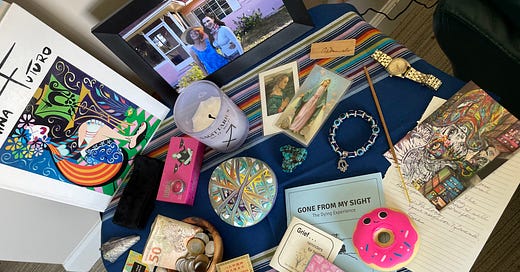




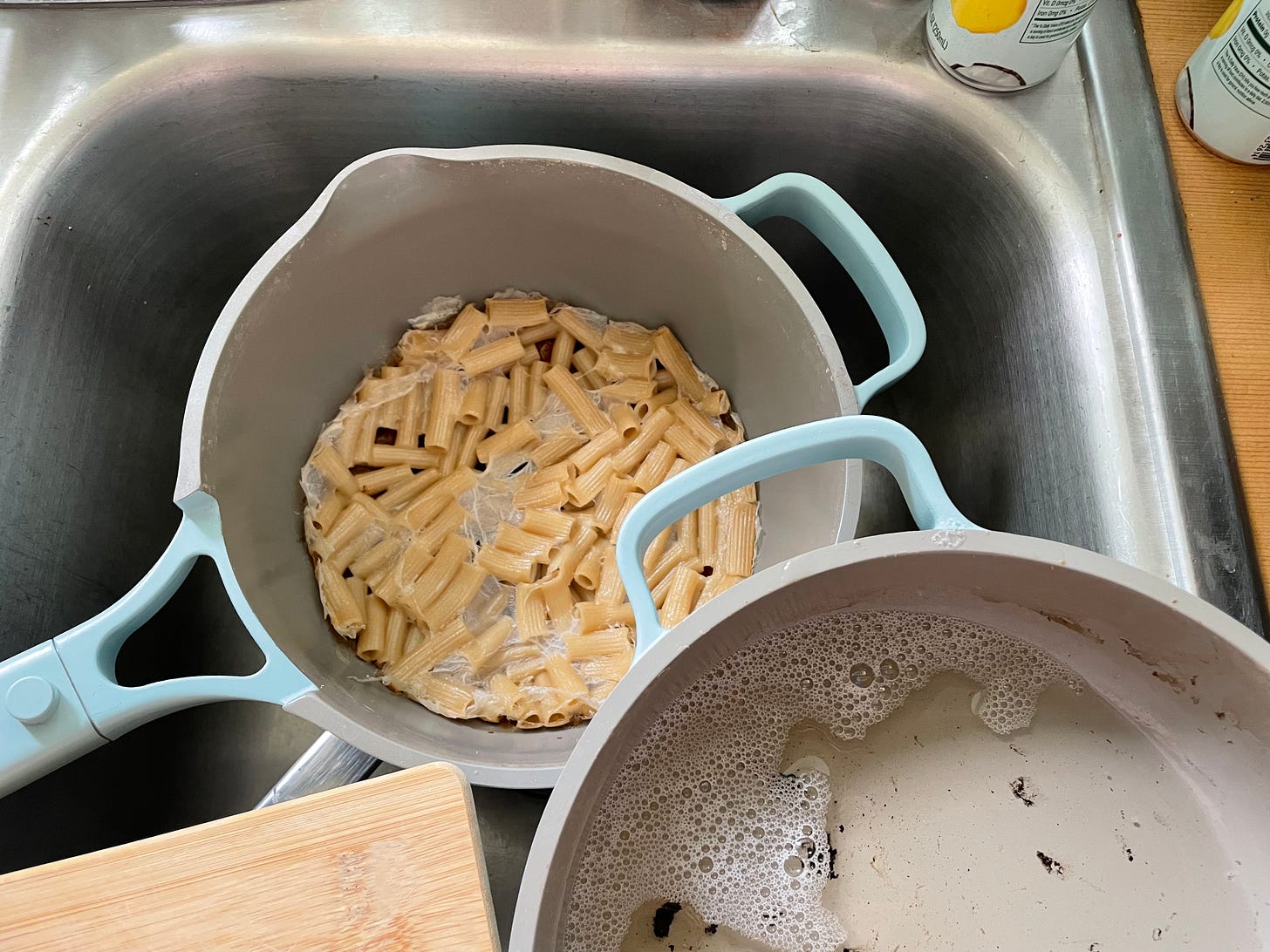
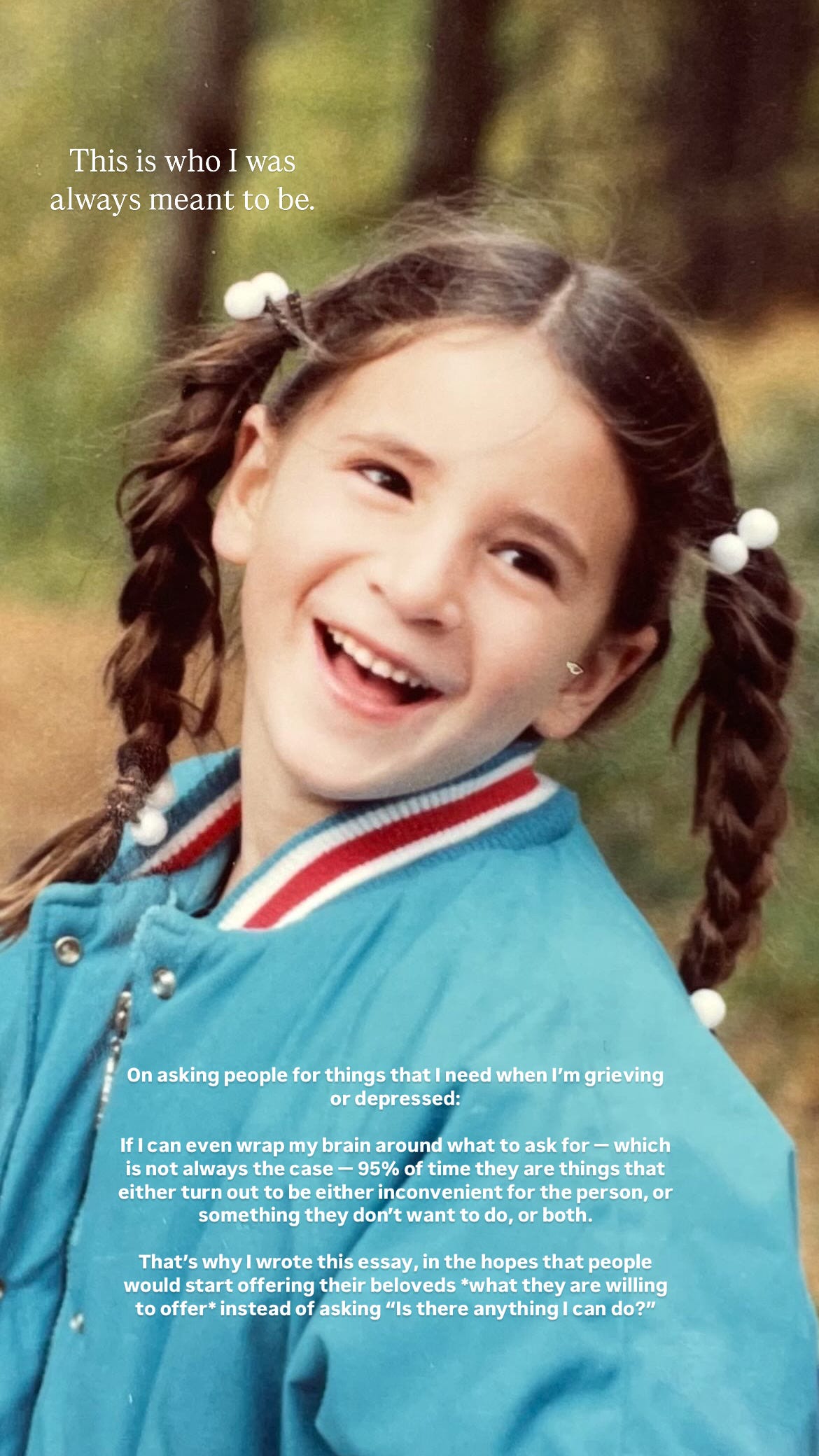
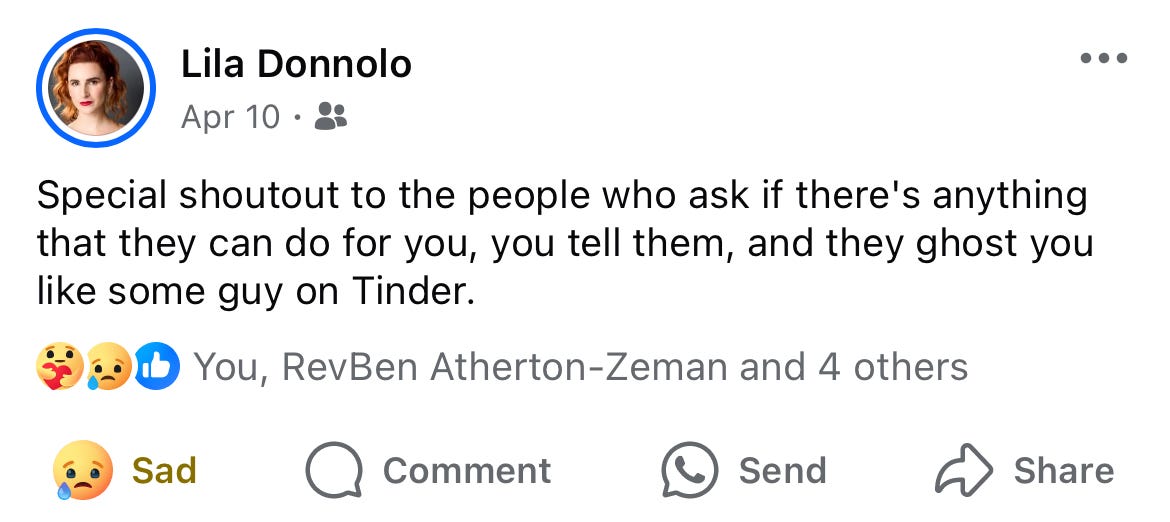
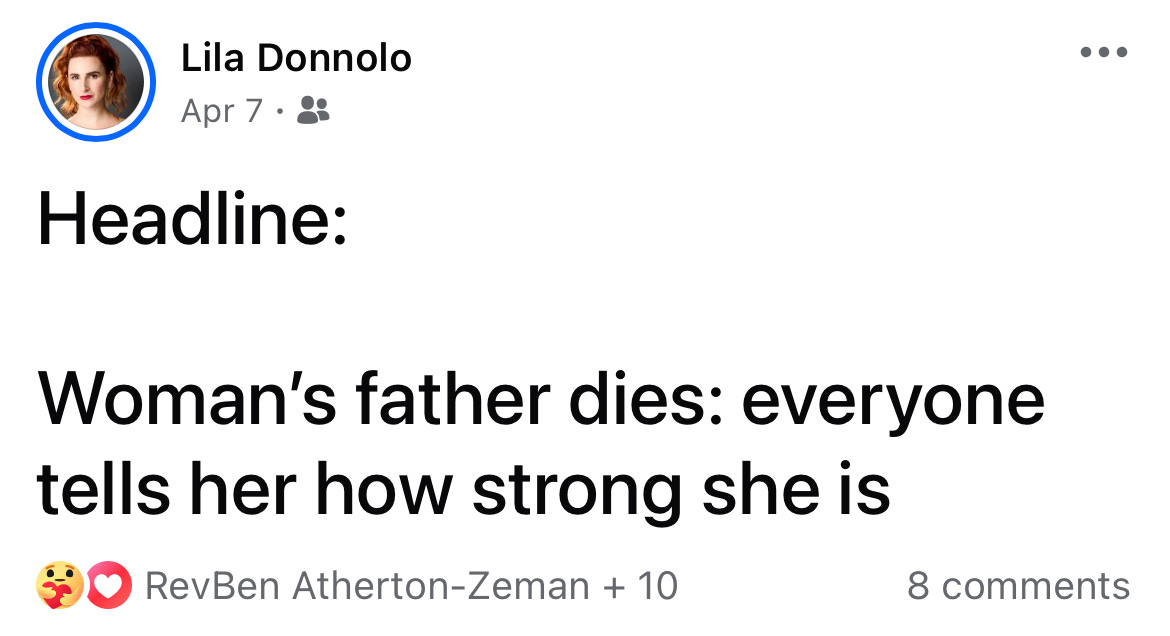
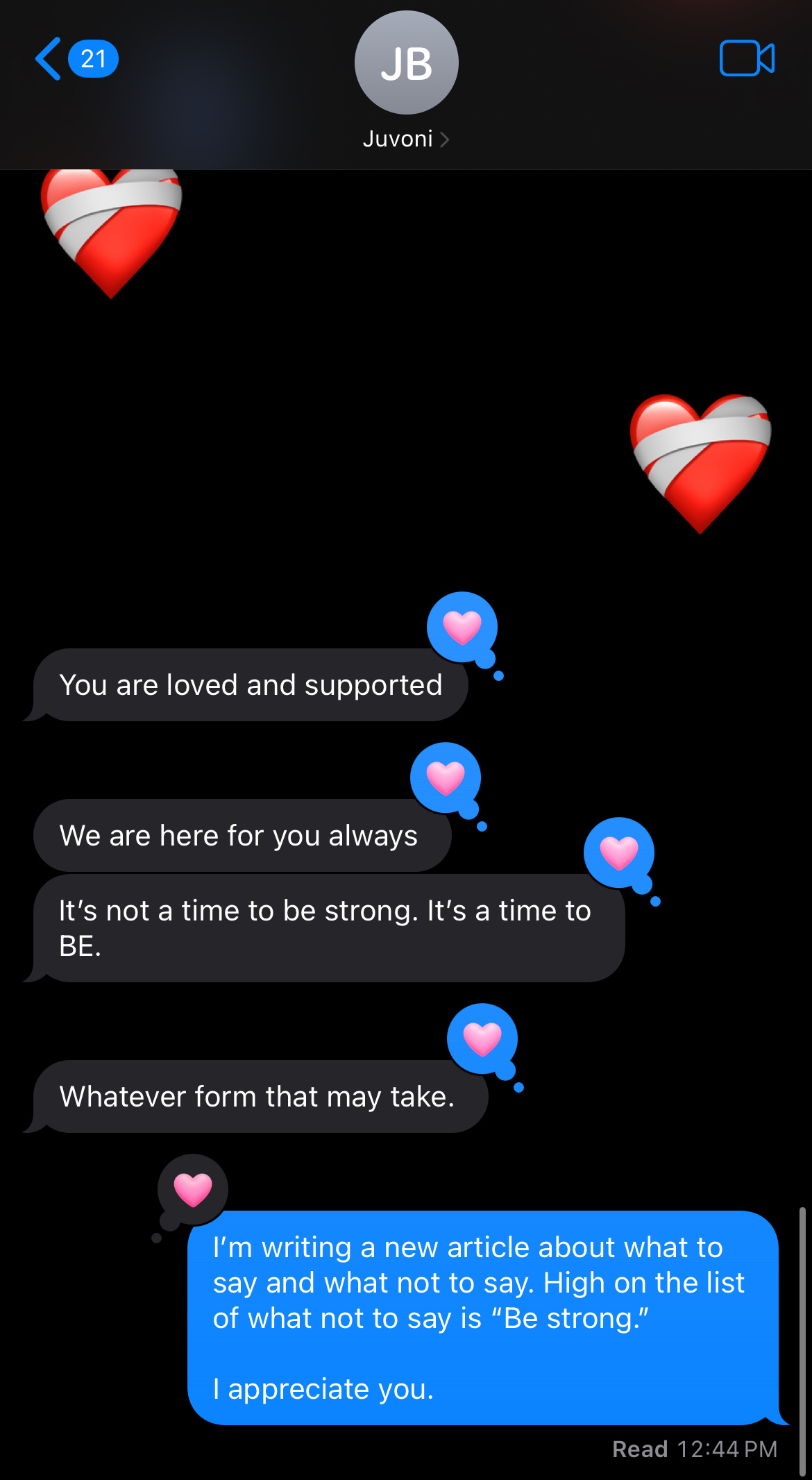
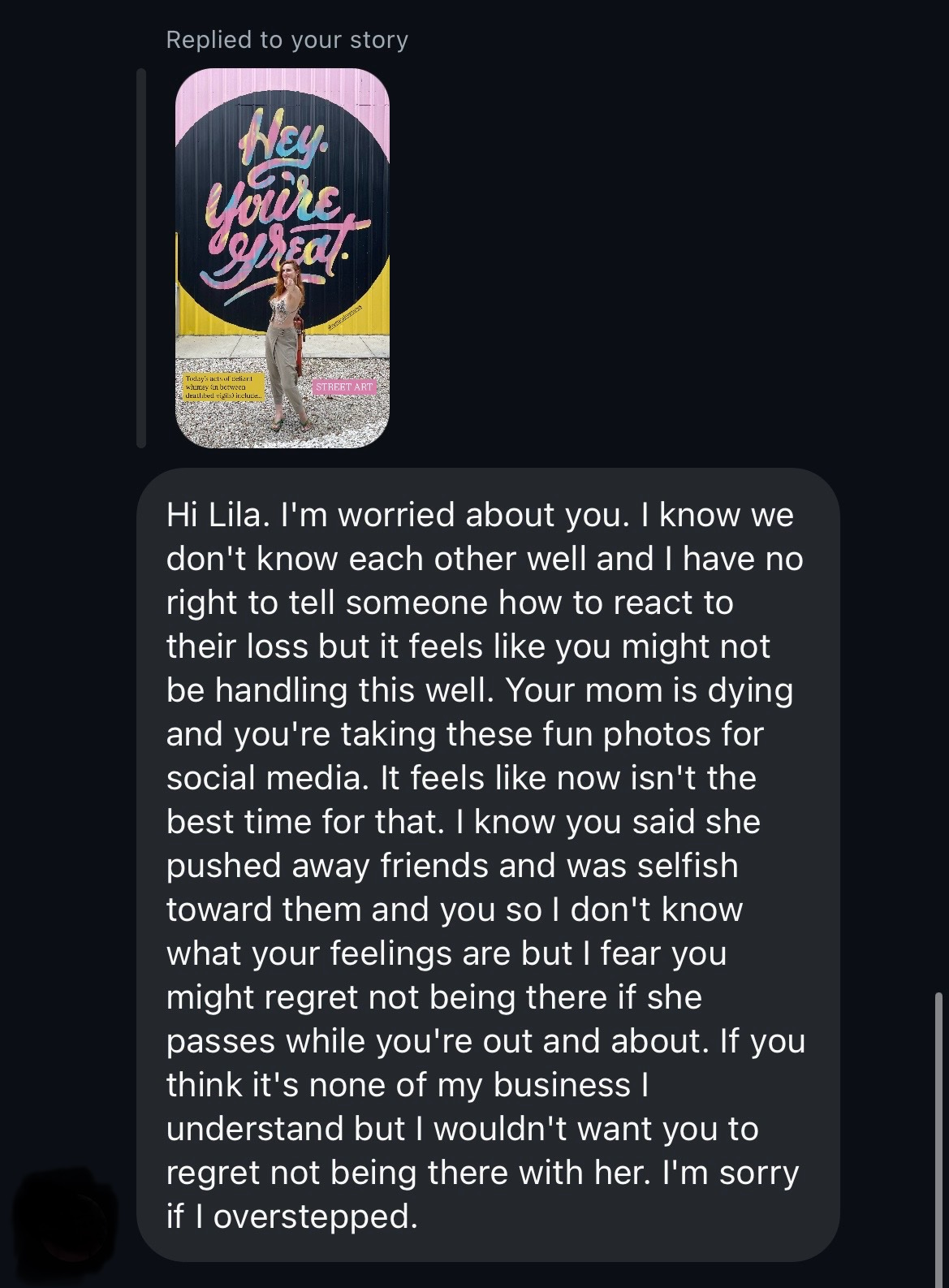
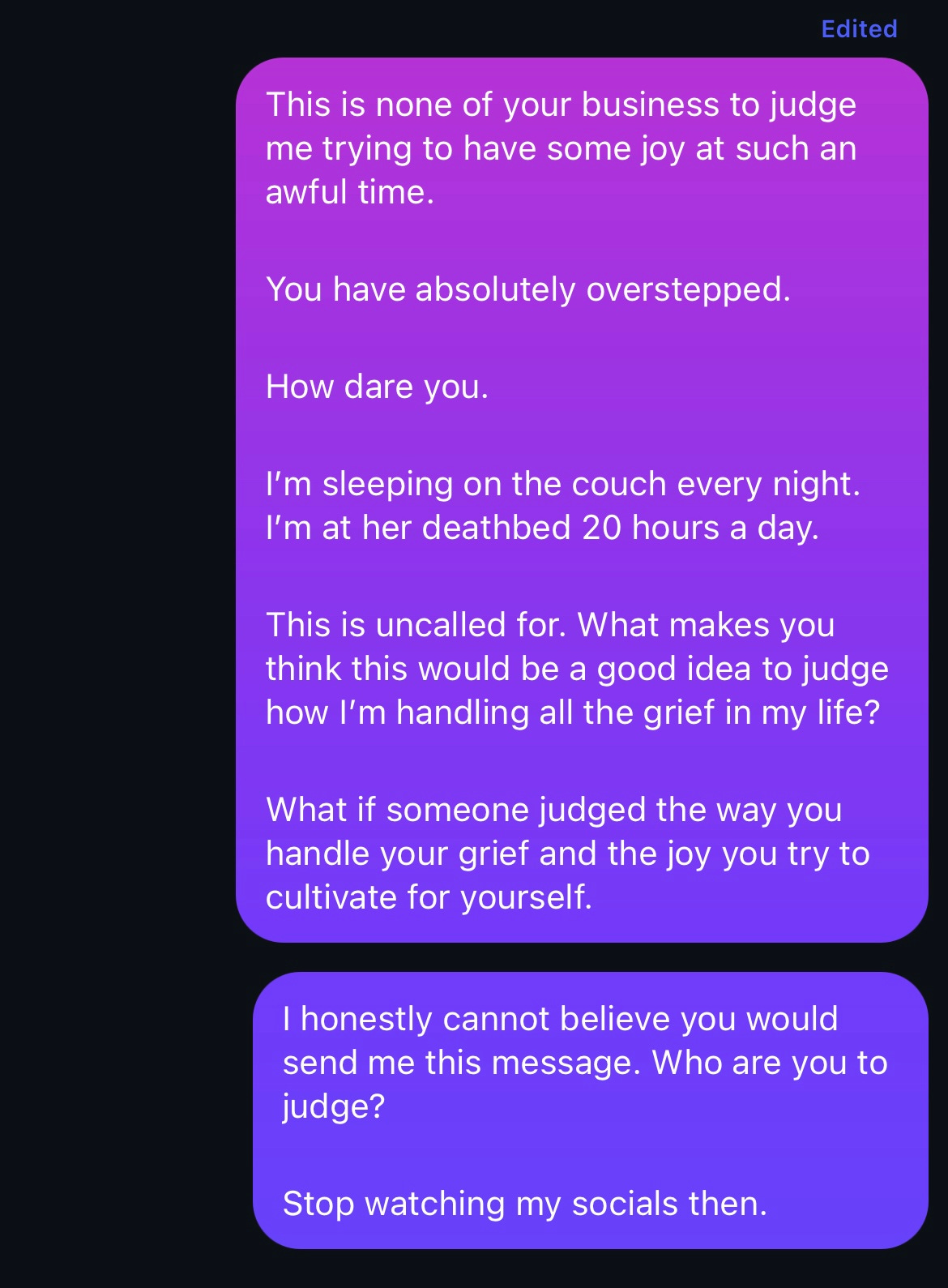


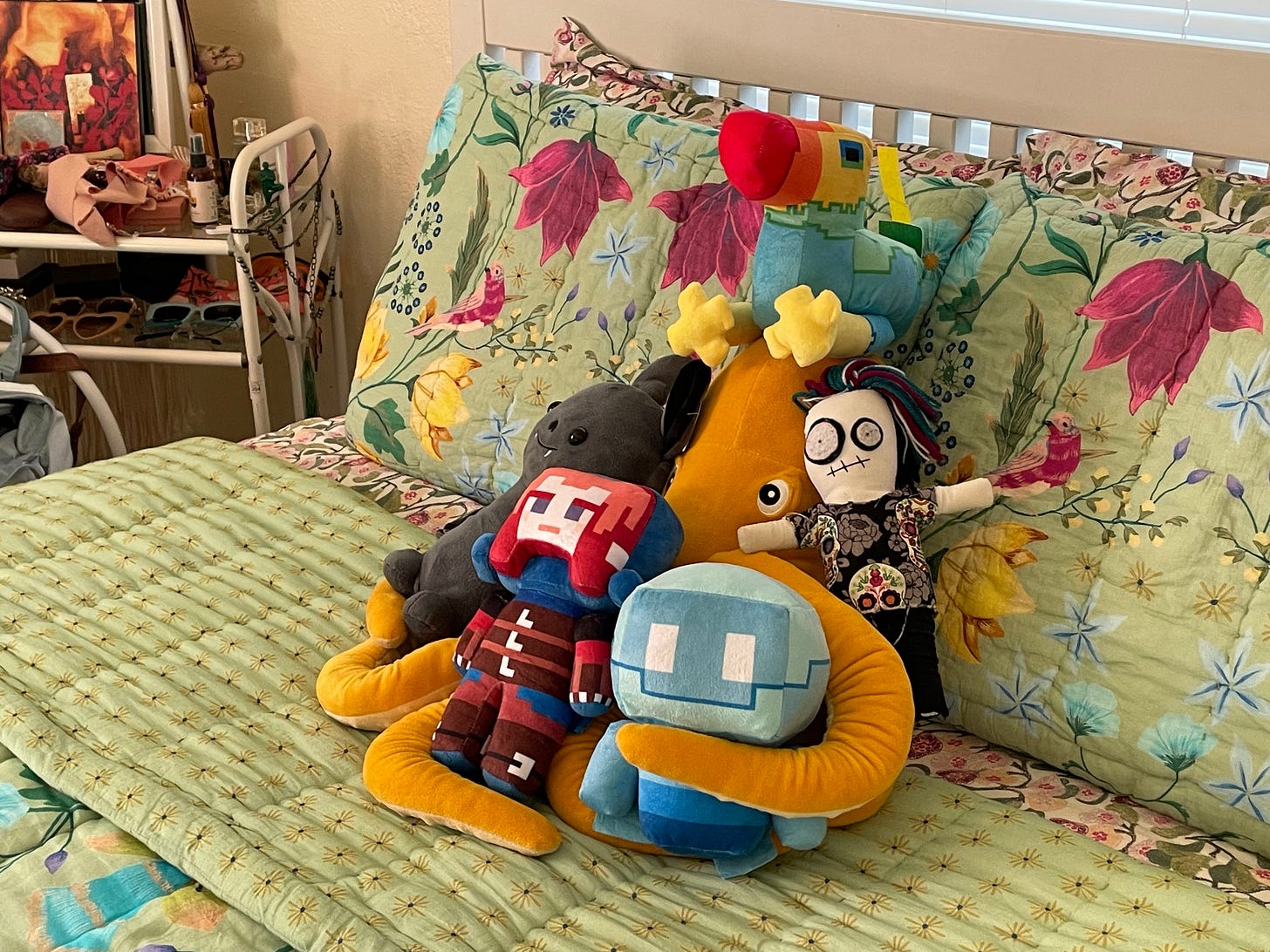
Grief Is not a greeting card. And you, Lila,
you remind us that grief isn’t generic where silence is golden, but platitudes cost. Consider the silence.
Let it be thick. Let it breathe.
Not every pause is a problem to fix.
Sometimes, it's just a place to sit.